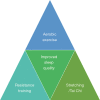Sleep disorders and exercise: a mini-review
- PMID: 37969282
- PMCID: PMC10636486
- DOI: 10.21037/jtd-23-17
Sleep disorders and exercise: a mini-review
Abstract
Sleep disturbance in a growing problem in the general population. As the prevalence of sleep disturbance rises, interest in treatment modalities including non-pharmaceutical interventions also grows. One of these potential modalities is exercise therapy. In individuals without sleep disorders, exercise appears to be beneficial in improving sleep architecture without any impact of the timing of exercise in relation to onset of sleep. The mechanisms for this are largely unknown but may be due to a combination of the effects of exercise on body temperature, autonomic control, endocrine and metabolic function. In obstructive sleep apnoea (OSA), supervised exercise therapy appears to have positive impact on daytime sleepiness with an unknown impact on sleep quality. The effect of exercise on central sleep apnoea (CSA) will be difficult to ascertain due to the low prevalence of this condition. In primary sleep disorders such as insomnia, narcolepsy and restless syndrome exercise may be useful in improving sleep architecture but the quality of the evidence supporting this remains low. In addition, the timing of exercise in relation to sleep onset remains under investigated. In individuals with circadian rhythm disorders, evening exercise appears to delay sleep onset. In shift-pattern workers, individuals with increased cardiorespiratory fitness report better sleep quality, suggesting exercise may be protective in this important population. To allow high quality evidence-based recommendations to be made about the value of exercise in individuals with sleep disorders, there is a significant need for large prospective studies with objective and subjective sleep quality as a primary outcome.
Keywords: Exercise; insomnia; restless leg syndrome; sleep; sleep apnoea.
2023 Journal of Thoracic Disease. All rights reserved.
Conflict of interest statement
Conflicts of Interest: All authors have completed the ICMJE uniform disclosure form (available at https://jtd.amegroups.com/article/view/10.21037/jtd-23-17/coif). The series “Clinical Update Sleep 2023” was commissioned by the editorial office without any funding or sponsorship. The authors have no other conflicts of interest to declare.
Figures
Similar articles
-
[Sleep disorders in patients with a neurocognitive disorder].Encephale. 2022 Jun;48(3):325-334. doi: 10.1016/j.encep.2021.08.014. Epub 2021 Dec 14. Encephale. 2022. PMID: 34916075 Review. French.
-
Does obesity play a major role in the pathogenesis of sleep apnoea and its associated manifestations via inflammation, visceral adiposity, and insulin resistance?Arch Physiol Biochem. 2008 Oct;114(4):211-23. doi: 10.1080/13813450802364627. Arch Physiol Biochem. 2008. PMID: 18946782 Review.
-
Update on Research and Practices in Major Sleep Disorders: Part II-Insomnia, Willis-Ekbom Disease (Restless Leg Syndrome), and Narcolepsy.J Nurs Scholarsh. 2019 Nov;51(6):624-633. doi: 10.1111/jnu.12515. Epub 2019 Sep 16. J Nurs Scholarsh. 2019. PMID: 31524329 Review.
-
Subjective and objective features of sleep disorders in patients with acute ischemic or haemorrhagic stroke: It is not only sleep apnoea which is important.Med Hypotheses. 2020 Mar;136:109512. doi: 10.1016/j.mehy.2019.109512. Epub 2019 Nov 27. Med Hypotheses. 2020. PMID: 31837521
-
Drug therapy for obstructive sleep apnoea in adults.Cochrane Database Syst Rev. 2013 May 31;2013(5):CD003002. doi: 10.1002/14651858.CD003002.pub3. Cochrane Database Syst Rev. 2013. PMID: 23728641 Free PMC article. Review.
Cited by
-
Influence of exercise prescription intervention based on WeChat on glycolipid metabolism and fitness of suboptimal-health teachers.Medicine (Baltimore). 2024 May 24;103(21):e38167. doi: 10.1097/MD.0000000000038167. Medicine (Baltimore). 2024. PMID: 38788028 Free PMC article. Clinical Trial.
-
Effects of exercise on sleep in patients with epilepsy: A systematic review.Epilepsy Behav Rep. 2024 May 9;26:100675. doi: 10.1016/j.ebr.2024.100675. eCollection 2024. Epilepsy Behav Rep. 2024. PMID: 38779424 Free PMC article. Review.
References
-
- Norman JF, Von Essen SG, Fuchs RH, et al. Exercise training effect on obstructive sleep apnea syndrome. Sleep Res Online 2000;3:121-9. - PubMed
Publication types
LinkOut - more resources
Full Text Sources
Research Materials



